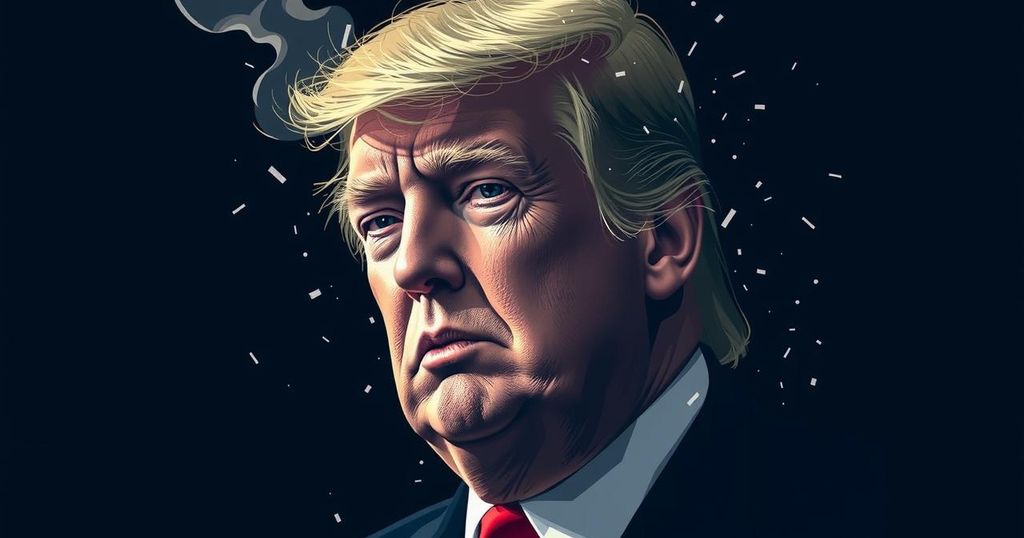World news
2024 PRESIDENTIAL ELECTION, AFP, ASIA, AXIOS, CHARLIE KIRK, COLOMBIA, ELECTION, GAVIN WAX, JAPAN, KAM, KAMAL, MADISON SQUARE GARDEN, MEDIA, MILWAUKEE, NEW YORK YOUNG REPUBLICAN CLUB, NORTH AMERICA, PRESIDENTIAL CAMPAIGN, PUERTO RICO, SOUTH AMERICA, TRUMP ADMINISTRATION, TURNING POINT, TURNING POINT USA, U.S. ELECTIONS, UNITED STATES, USA
Fatima Khan
0 Comments
Trump’s Election Anxiety Heightens as Election Day Approaches
Former President Donald Trump’s anxiety before Election Day is on the rise, despite his team’s confident outlook. He is increasingly engaged with aides about his chances of winning, while voter turnout trends, particularly among males, concern his campaign. With a series of flashy rallies and a focus on allegations of voter fraud, Trump’s strategy reflects his urgency to secure a win. His final campaign push involves multiple visits to swing states, aiming to galvanize support as the election nears.
In the days leading up to Election Day, former President Donald Trump’s anxiety appears to be mounting despite his campaign team’s assertion of confidence regarding his electoral prospects. A campaign official disclosed to Axios that Trump has been increasingly inquisitive about his chances of winning, demanding heightened efforts from his aides. This restlessness has influenced his campaign strategy, characterized by attention-grabbing rallies, media spectacles, and a renewed focus on allegations of voter fraud, which remains a significant concern for him. Recently, Trump drew encouragement from an internal memo authored by Tony Fabrizio, the chief pollster for each of Trump’s presidential campaigns. The memo suggested that Trump is in a stronger position for victory than he was in 2020. However, beneath this optimism lies Trump’s evident anxiety, as shown by his late-night and early morning calls to staff, probing about the progress of the campaign and their expectations of a favorable outcome. This sense of urgency is also prevalent among Trump’s supporters, especially concerning the early voting trends that indicate lower turnout rates among male voters. As the election landscape appears to be gender-divided, with most male voters leaning towards Trump and most female voters favoring Kamala Harris, some conservatives are vocalizing their concerns over the significance of early male voter turnout. Charlie Kirk from Turning Point USA emphasized this notion, warning that if male voters do not participate, it could jeopardize Trump’s chances. In his final campaign push, Trump has engaged in a series of high-profile events, including a controversial rally at Madison Square Garden, which attracted attention for several offensive remarks made by speakers. Trump’s commitment to energizing his base is further evident through his ongoing outreach in swing states like Colorado and New Mexico, primarily to utilize visually appealing backdrops to discuss immigration issues, rather than pursuing elections in these states directly. Moreover, the Trump campaign has established a robust unit focused on “election integrity,” which has been instrumental in filing lawsuits and addressing potential voting irregularities that could undermine public confidence in the election outcome. Trump has indicated that he would assign blame to Republican National Committee Chair Michael Whatley should the election not turn out in his favor. In the final stretch of his campaign, Trump is slated for four trips to North Carolina, as advisors believe that increased visibility in this critical swing state will enhance his chances of securing victory, regardless of any potential distancing from the controversial state ticket holder, Lt. Gov. Mark Robinson.
The article discusses the climate surrounding the upcoming election, particularly focusing on the anxiety and strategies of former President Donald Trump. It addresses how his campaign’s recent activities reflect both a need for heightened outreach as well as a response to internal and external pressures regarding voter turnout, particularly among male demographics. The contrasting dynamics of early voting trends and Trump’s response mechanisms are also highlighted, giving insight into the various factors influencing the election as it approaches.
In conclusion, former President Donald Trump’s pre-election anxiety underscores the significance of both voter turnout and campaign strategies in what appears to be a competitive election. His reliance on appeals to his base, alongside a proactive stance on alleged voting irregularities, illustrates the complex landscape of this campaign. Moving forward, Trump’s commitment to increasing visibility in crucial states may determine his electoral fortunes as Election Day approaches.
Original Source: www.axios.com




Post Comment